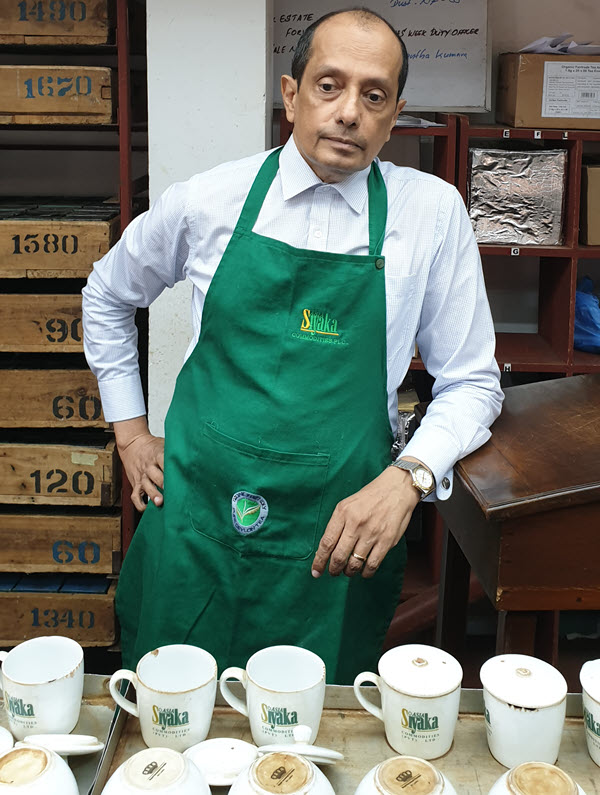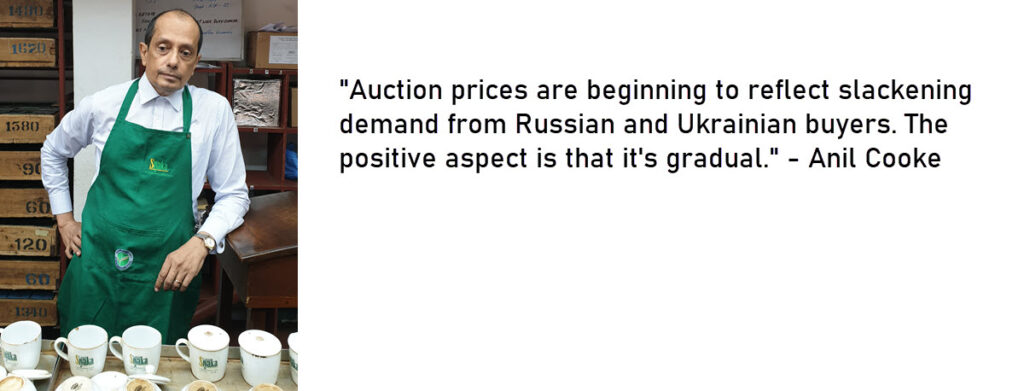This week Tea Biz traveled to Colombo, Sri Lanka to assess the impact of the war in Ukraine on one of the Russian Federation’s most important tea trading partners. Correspondent Dananjaya Silva spoke with veteran exporter Anil Cooke, managing director and CEO of Asia Siyaka Commodities, whose insights offer clarity amid a fast-changing crisis that is disturbing global harmony in tea.
- Caption: Anil Cooke, managing director and CEO of Asia Siyaka Commodities in Colombo, Sri Lanka
Hear the interview
Sanctions Trigger Halt in Tea Shipments to Russia
By Dananjaya Silva | PMD Tea
The Russian Federation faces an unprecedented combination of payment and logistics barriers that are interrupting supply. The combined resolve of governments condemning the unprovoked invasion of Ukraine has created uncertainty over prompt clearance of payments. Sanctions that exclude several Russian banks from the SWIFT global payment system and threaten the liquidity of Russia’s Central Bank led to a severe devaluation of the ruble (currently trading for less than 1 cent USD) making tea imports far more costly. That action led MasterCard, American Express, and VISA to suspend transactions at physical locations in Russia or online. Apple Pay and Google Pay systems did the same. Separately the US, EU, Canada, and UK closed their airspace to Russian owned and operated aircraft.
The collective refusal of the world’s largest container shipping companies to deliver or receive goods poses additional barriers to the movement of tea. Russia annually imports 150,000 metric tons of tea — a total likely to plummet in 2022.
Correspondent Dananjaya Silva, managing director of PMD Tea in London was in Colombo this week where he spoke with Anil Cooke.
Dananjaya Silva: Will you discuss the current situation in Ukraine?
Anil Cooke: It’s critical for Sri Lanka. Last year, Russia imported 27 million kilograms and 29 million kilograms the year before. And Ukraine has been steady at around 4 million kilos each year over the last three years. So that’s approximately 10% of all the tea shipped by Sri Lanka.
The impact of these two markets is varied in the sense that they buy a whole cross-section of grades from small-leaf, high-growns, to a mix of black leaf orthodox teas. And that could be a definite issue with the depth of demand at the digital auctions, given the uncertainty over trade with these countries. At the moment there’s tea that has already been shipped. Often, the importers operate on a degree of credit, sometimes 30 to 60 days. We are not certain how long these proceeds will take to reach Sri Lanka.
The other concern is that it looks like shipping and movement of cargo to these markets will be restricted in the immediate short term. We find there are fewer [shipping] lines operating at the moment. So, we’ll have to wait and see.
Dananjaya: Will you provide some insight on the current price realization? Are you concerned about clearing payments with Russia, given the magnitude of sanctions prevent tea transactions? Do you anticipate workarounds and bartering of commodities?
Anil: Auction prices are beginning to reflect slackening demand from Russian and Ukrainian buyers.
The positive aspect is that it’s gradual. Right now, Colombo, Sri Lanka is in the midst of its western quality season. And it’s been pretty dry with production low. So, I don’t see this being felt until a few weeks further downstream, because there is ample demand to take up the available quantities on offer.
The impact of sanctions on the banking system is also unclear. We are aware that there are yet some banks that have not been prevented from doing business. The impact of SWIFT will be visible later.
[Editor’s Note: SWIFT is a secure protocol used by 11,000 financial institutions to transfer about 70% of interbank funds. Founded in 1973, SWIFT is managed by the Society for Worldwide Interbank Financial Telecommunication. The EU, UK, Canada, UK, and the US barred seven Russian banks as of March 1 and are expected to add more to the list, according to Reuters. SWIFT announced the disconnect is effective March 12. This is only the second time that the world’s central banks agreed to sanction a country’s banking system, writes Forbes.]On the face of it, these sanctions could bite and stop the movement of goods, even though in most cases sanctions are not supposed to block the movement of food.
Dananjaya: Do you see Sri Lanka adopting a bank settlement system in currencies other than US dollars, like that developed with Iran to circumvent sanctions, happening with Russia?
Anil: The system with Iran was unique. It was in relation to historic debt on previous oil shipments, which is not the case here.
[Editor’s Note: Air, land, and sea carriers that refused booking to and from Russia confirmed they will deliver tea, coffee, and humanitarian products. In aggregate these carriers represent more than half the volume of goods shipped in containers.]Dananjaya: Assuming hostilities and sanctions continue, how will logistics impact sales given the difficulties of delivering cargo? It appears that it will be simpler to ship tea elsewhere. Is there sufficient demand in the rest of the world? Or should the Orthodox producers throttle back?
Anil: The biggest challenge is movement of tea to Russia. The impact on most black tea markets is significant, particularly the Orthodox producers.
Sri Lanka, South India, and Vietnam would feel it to a great extent and Kenya to a lesser extent, but from Sri Lanka’s point of view, we can cope without this demand, because I anticipate a drop in production this year.
Sri Lanka has already been struggling with shortages of fertilizer and even if the rains are on schedule, I believe that the crop loss would balance the reduced demand from Russia and Ukraine. The way things are going, even the movement of cargo to Belarus is likely to be restricted.
So, this is a transitional phase. I think we will overcome lower demand from Russia because there’s plenty of interest from North Africa and the Middle East.
We also believe that some of the Russian tea drinkers who moved to coffee may come back to tea due to less discretionary income with the depreciation of the ruble. That’s a hopeful interpretation of how the customer would behave in what is a complex situation.
I think it’s going to be tough on the world for tea, particularly the most vulnerable people in the value chain, the farmers and the workers and the tea producers. We don’t need this kind of disruption to a situation that is already complex, and as you know, people suffering and not making ends meet at the producer level.
So, this is a totally unnecessary problem. If one considers the absolute destruction in Ukraine, we don’t know when these people will be able to return to some sort of normalcy. Cessation of violence will not enable them to simply restart their previous lives.
There will also be a price that the Russian public will have to pay for this because the sanctions will bite deep and remain in place for a long time.
Invariably it’s the most innocent who are the victims of all of this.
London-based Dananjaya Silva is the managing director of PMD Tea and a fourth-generation tea man whose family business, P.M. David Silva & Sons date to 1945 during the Plantation Raj in Ceylon’s Dimbula Valley. The company was founded on Brunswick Estate in the fertile Maskeliya Valley as a small independent Tea shop for tea plantation workers to gather, relax and enjoy a quality cup of tea.

Asia Siyaka Commodities is one of Sri Lanka’s leading market intermediaries in the tea industry. The 16-year-old licensed tea brokerage has built a reputation for innovation and dynamism and has played a pertinent role in transforming Sri Lanka’s tea auction logistics, which is now among the most sophisticated and structured systems in the world. The company trades an average of 40 million kilos of tea annually and ranks consistently among the top four tea brokers both in terms of traded volumes, with a 14% market share, and prices obtained. Services include warehousing and tea factory development. To learn more, visit www.asiasiyaka.com
Link to share this post with your colleagues
Signup and receive Tea Biz weekly in your inbox.



